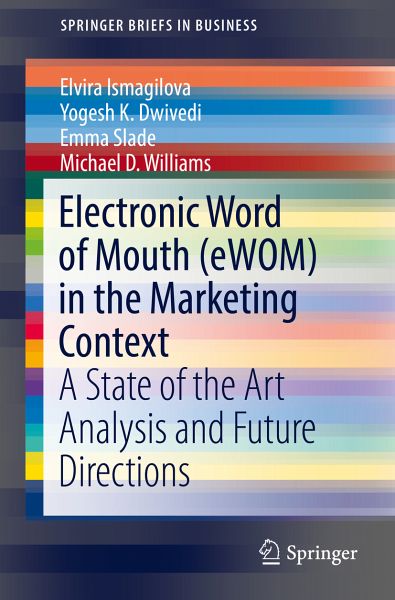
Electronic Word of Mouth (eWOM) in the Marketing Context (eBook, PDF)
A State of the Art Analysis and Future Directions
Versandkostenfrei!
Sofort per Download lieferbar
44,95 €
inkl. MwSt.
Weitere Ausgaben:

PAYBACK Punkte
22 °P sammeln!
This SpringerBrief offers a state of the art analysis of electronic word-of-mouth (eWOM) communications and its role in marketing. The book begins with an overview of traditional word-of-mouth (WOM) and its evolution to eWOM. It discusses the differences between traditional and online WOM. The book examines why people engage in eWOM communications, but also how consumers evaluate its persuasiveness. It also looks at the effects of eWOM. The book identifies current gaps in the eWOM research, but also highlights future directions for this growing field. eWOM is an important marketing technique i...
This SpringerBrief offers a state of the art analysis of electronic word-of-mouth (eWOM) communications and its role in marketing. The book begins with an overview of traditional word-of-mouth (WOM) and its evolution to eWOM. It discusses the differences between traditional and online WOM. The book examines why people engage in eWOM communications, but also how consumers evaluate its persuasiveness. It also looks at the effects of eWOM. The book identifies current gaps in the eWOM research, but also highlights future directions for this growing field.
eWOM is an important marketing technique in brand communications, and it plays an important role in modern e-commerce. Marketers become extremely interested in enhancing the power of eWOM developing loyalty programs and building brands. Studying the effect of eWOM can be beneficial for companies. This book should be a good resource for scholars and practitioners that need to understand the pervasive effects of eWOM.
eWOM is an important marketing technique in brand communications, and it plays an important role in modern e-commerce. Marketers become extremely interested in enhancing the power of eWOM developing loyalty programs and building brands. Studying the effect of eWOM can be beneficial for companies. This book should be a good resource for scholars and practitioners that need to understand the pervasive effects of eWOM.
Dieser Download kann aus rechtlichen Gründen nur mit Rechnungsadresse in A, B, BG, CY, CZ, D, DK, EW, E, FIN, F, GR, HR, H, IRL, I, LT, L, LR, M, NL, PL, P, R, S, SLO, SK ausgeliefert werden.












